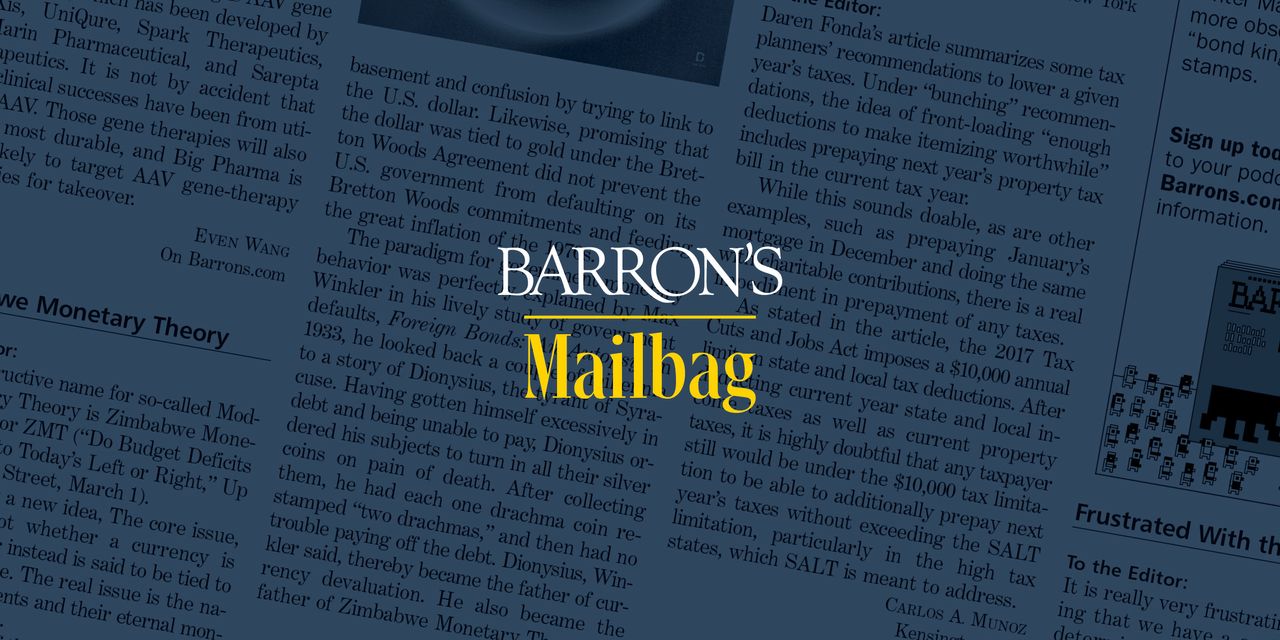To the Editor:
Despite the most inverted yield curve since 1981, the first contraction in the money supply since the Great Depression, and 14 straight months of declines in the Leading Economic Index, most members of the Barron’s Roundtable are fairly sanguine about the future (“Beyond Big Tech,” July 14).
Goethe said that the intelligent man finds almost everything ridiculous. I don’t know how intelligent I am, but this feels ridiculous.
I suspect that the recent softness in jobs and inflation isn’t the first step toward economic paradise but the first step into the abyss. I fear that the next relevant quote will be from Bing Crosby, who sang at the depth of the Depression, “Brother, can you spare a dime?”
Gene Sweet
Chicago
To the Editor:
Interesting that no energy stocks are mentioned. Some sell for less than five times earnings; others have 10%-plus dividends.
Robert Ray
On Barrons.com
Higher Equity Prices
To the Editor:
As noted by Ben Levisohn, the dollar has recently been declining, and a weaker dollar should be good for risk assets (“Inflation Rarely Falls This Fast. What It Means for the Stock Market,” Up & Down Wall Street, July 14). One additional reason for this positive impact is that a weaker dollar will result in higher reported earnings by U.S. multinational corporations.
When these companies report their financial results, they convert their foreign earnings into U.S. dollars. If the U.S. dollar weakens against the foreign currencies in which the earnings were generated, the translated value in U.S. dollars will be higher, leading to higher reported earnings. This in turn should result in higher equity prices.
David I. Kass
University of Maryland
College Park, Md.
Helping Folks
To the Editor:
Excellent investigative journalism (“The U.S. Treasury Hoped to Aid Low-Income Home Buyers. The Help Went to Johnny Depp, Too,” July 13). Hopefully, even more light will be shined on the Change Co. and this lending program so we can get to the place originally envisioned—helping the people who need it most.
Vincent Scialli
On Barrons.com
No Thanks, Frontier
To the Editor:
In an otherwise optimistic story (“Buy Frontier Communications Stock. High-Speed Internet Will Boost Shares,” July 14), it seems that Nicholas Jasinski hit a speed bump. The recent Wall Street Journal article exposing all of the lead-sheathed copper wires across the country had a new angle—the illnesses they may have caused employees and some nearby the wires in recent decades.
While the newly lowered stock price of Frontier might look enticing, investors have watched shares in 3M (“forever” chemicals, military earplugs) and Johnson & Johnson (talcum powder) become dead money over lawsuits that drag on for years.
I expect that it may now be the same for AT&T, Verizon, and yes, Frontier Communications, with lofty dividends at risk for the first two telecom giants. So, thanks but no thanks.
Tom Ward
Cumberland, R.I.
Past, Not Prologue
To the Editor:
Let’s see if I have this right. If there is an uptick of people wearing lipstick and men’s underwear while drinking Champagne and dining out, is the economy on a roll? (“Is a Recession Coming? Better Check Men’s Underwear Sales,” July 5). While I can appreciate analysts trying to make sense of future trends by analyzing similar trends from the past, it is becoming increasingly clear that the past is bearing less and less resemblance to the present or future. History may show that there have been recessions accompanied by bull markets, but America today is certainly not the same as America after the end of the Civil War, the end of World Wars I and II, the 1926-27 recession, or the end of the Korean War. Combining the massive changes brought on by the digital revolution with the lasting side effects of Covid-19 has created an America that frankly is very difficult to judge by historical norms.
Perhaps we should utilize the incredible analytical power of artificial intelligence to probe the massive amounts of available data to come up with better predictors.
Arthur M. Shatz
Astoria, N.Y.
Price Controls
To the Editor:
Lori Calvasina draws a number of apt comparisons between the immediate postwar economy and our present situation (“Why This Stock Strategist Sees Parallels With 1945,” Interview, July 6).
However, she left out the big difference: price controls. When controls were dropped after the war, prices rose, markets cleared, and shortages disappeared immediately. Sneakers were cheap in 1944, but there weren’t any. I had to wear bowling shoes. I remember it well.
Claude Burdick
Livermore, Calif.
Send letters to: [email protected]. To be considered for publication, correspondence must bear the writer’s name, address, and phone number. Letters are subject to editing.
Read the full article here


